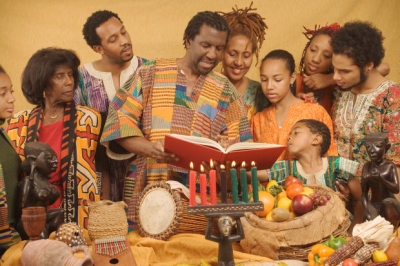
Kwanzaa is a celebration of African family, community, and culture. This African American holiday was created in 1966 by a professor named Maulana Karenga. The holiday is based on African harvest festivals. Its name comes from the African language Swahili and means “first fruits.” The holiday takes place each year from December 26 to January 1.
The symbols of the festival come from different African cultures. The symbols include a candleholder, seven candles, ears of corn, gifts, and a unity cup. The celebrants use the unity cup to salute their ancestors and to show unity in the family and community. Each day of Kwanzaa is dedicated to one of seven principles, or ideas. The principles are unity, self-determination, collective responsibility, cooperative economics, purpose, creativity, and faith. Each night, one or more of seven candles arranged in a candleholder is lit. Then, one of the seven principles is discussed. Kwanzaa is also celebrated with a community feast on December 31.
Aside from the seven principles or traditions, Kwanzaa also has seven holiday symbols, namely crops (fruits, nuts, and vegetables), gifts, ears of corn, and straw mat. Moreover, there are seven candles colored black, green and red on a kinara (candleholder) and community cup.
The celebration on the last day of the year is usually grand, with a community feast or karamu, where African-American families are joining the celebration. Some of them wear traditional clothes. There could be traditional African drums, dances, songs, poetry reading, and storytelling. Typically, the feast consists of traditional African dishes.
Credit : Britannica
Picture Credit : Google




